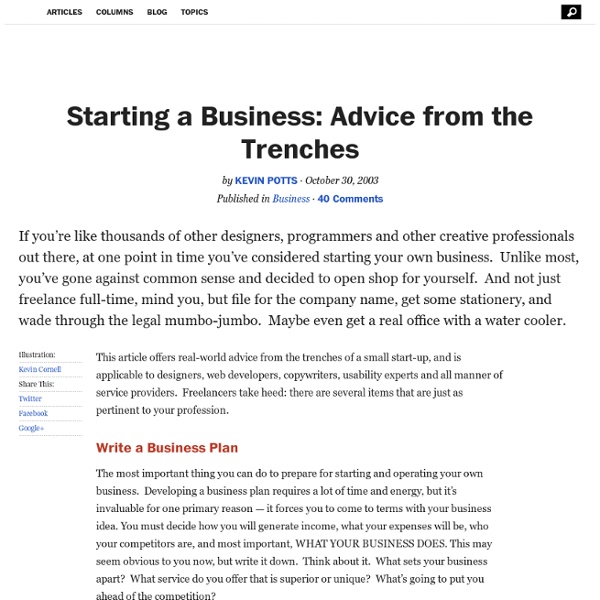10 Blogs Entrepreneurs Need to Be Reading
See the 2012 edition: 10 Must Read Blogs for Entrepreneurs (2012 Edition) #1. The Toilet Paper Entrepreneur Site: What it is:
Business Ideas for the Self Employed
Several years ago, I had a lovely long-term consulting assignment which kept me both busy and solvent. One morning I woke up and realized that it was coming to an end and I had nothing lined up. After a few moments of panic, I decided to get serious about creating my next income source. I didn’t have a great deal of time to devote to this, so I gave myself the challenge of finding a way to earn $100—an easily accomplished goal. What I didn’t realize at the time, was that I had just created a new habit that has kept my business—and cash flow—moving smoothly along. Over time, I’ve learned that there are other benefits to this simple technique.
Startup Advice: How Entrepeneurs Gain Credibility
While talking with young founders in Europe and the US over the last couple months, I have been asked the same question repeatedly -- how can an entrepreneur just starting out gain the necessary credibility to attract capital? It is an important question because, at its heart, a startup investment is an investment in the entrepreneur. And the earlier stage the investment, the more so this is true. We all know the allure of the elusive "serial entrepreneur" -- the rare breed who has done it before (successfully) and will not fall victim to the same business pitfalls (he'll have to discover new ones). I have backed serial entrepreneurs before and will continue to back them.
Entrepreneur Startup Advice
I usually tell people that everything I learned about being an entrepreneur I learned by F’ing up at my first company. I think the sign of a good entrepreneur is the ability to spot your mistakes, correct quickly and not repeat the mistakes. I made plenty of mistakes. Below are some of the lessons I learned along the way. If there’s a link on a title below I’ve written the post, if not I plan to.
Mozilla Firefox
1. You can make a photograph of anything and anyone on any public property, except where a specific law prohibits it. e.g. streets, sidewalks, town squares, parks, government buildings open to the public, and public libraries. 2. You may shoot on private property if it is open to the public, but you are obligated to stop if the owner requests it. e.g. malls, retail stores, restaurants, banks, and office building lobbies. 3. Private property owners can prevent photography ON their property, but not photography OF their property from a public location. 4. Anyone can be photographed without consent when they are in a public place unless there is a reasonable expectation of privacy. e.g. private homes, restrooms, dressing rooms, medical facilities, and phone booths. 5.
29 Ways to Collect Email Addresses for Your Business
Looking for ways to grow your list of newsletter subscribers? There are a ton of ways to get people to sign up for your weekly or monthly email marketing campaigns. I’ve put together a list for you to read, so you have heaps of options for growing your list.
How Your Employees Can Be Your Best Salespeople
Column by Janine Popick, Inc.com "Girl Power Female CEOs" June 21, 2011 How can you get your non-sales employees to help "sell" your business? If you have salespeople, you know what they're usually motivated by: cold hard cash.
Top 10 Traits Of Highly Successful People
Rating: 8.2/10 (185 votes cast) We have all read about people who are successful briefly. They win a gold medal, make a fortune, or star in one great movie and then disappear.…These examples do not inspire me! My focus and fascination is with people who seem to do well in many areas of life, and do it over and over through a lifetime. In entertainment, I think of Paul Newman and Bill Cosby.
10 Essential PR Tips for Startups
Erica Swallow is a technology and lifestyle writer. Sign up for her course on "PR for Startups" to learn more about getting media coverage for your fledgling business. It can be challenging for unknown startups to garner press attention — budgets are tight, relationships with journalists may not be that strong and explaining a new concept is difficult.
10 Rock Solid Website Layout Examples
Keeping It Simple Page layout is equal parts art and science. Creating something that’s visually attractive and unique takes an artist’s eye.
46 Ways To Start A Business With No Money
Most people who want to start their own business don’t have a ton of money laying around and it’s probably one the most common questions I get emailed about: How can I get started without a lot of cash? Well I’ve put together a list below of the best ideas I’ve heard and personally used. I hope you find it useful! The three basic strategies to starting a business without much money are:
How to pick a co-founder
Naval · November 12th, 2009 Update: Also see our 40-minute interview on this topic. Picking a co-founder is your most important decision. It’s more important than your product, market, and investors. The ideal founding team is two individuals, with a history of working together, of similar age and financial standing, with mutual respect. One is good at building products and the other is good at selling them.



